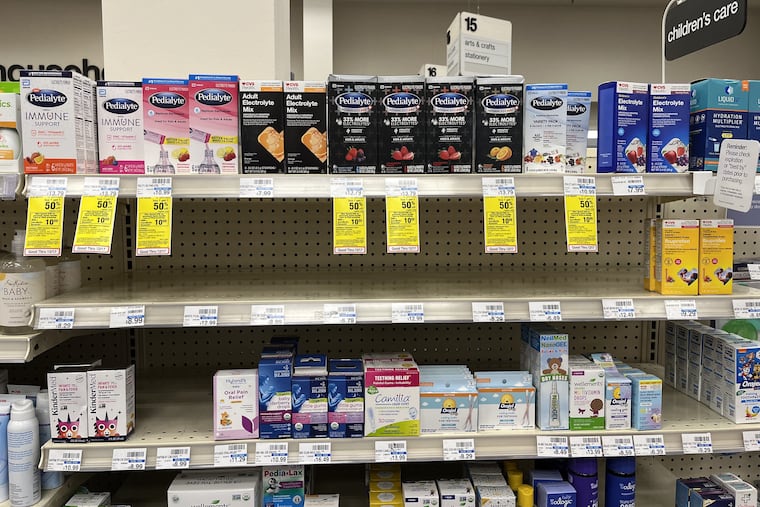Empty cold-medicine shelves in pharmacies are adding stress to parents amidst a ‘tridemic’
With a surge of respiratory viruses sickening thousands of children and overwhelming hospitals, a critical tool to help families manage seasonal illness at home is in short supply.

A bottle of infant Tylenol is a staple in Mo Manklang’s medicine cabinet. Her year-old son, Rex, was born two months early, so Manklang is extra cautious about his health. Lately, she relies on the medication to ease Rex’s teething pain. But having it on hand also gives her peace of mind that she doesn’t need to rush to the doctor’s office any time he seems unwell.
“If you don’t have it, that is really hard to discern, what the right thing to do to make sure your kid’s OK,” she said.
Now, with a surge of respiratory viruses sickening thousands of children and overwhelming hospitals, a critical tool to help families manage seasonal illness at home is in short supply. Many pharmacies in the Philadelphia area and in other cities are running out of Tylenol, Motrin, and their generic equivalents.
» READ MORE: Can I give my kid expired Tylenol? A pediatrician’s tips for the cold medicine shortage
The Food and Drug Administration has not declared an official shortage because the agency has not identified any supply chain or manufacturing issues. In an interview with CNN, an FDA official attributed the shortage to above-average demand.
Johnson & Jonson, which produces children’s Tylenol and Motrin, told the New York Times that although there is no nationwide shortage, “products may be less readily available at some stores” due to an increase in demand.
CVS and Walgreens are limiting the number of children’s over-the-counter medications that shoppers can buy. CVS imposed a two-product limit on pain-reducing medications in all pharmacies and online, while Walgreens imposed a six-product limit on fever-reducing medicines only on online purchases.
It is the latest drug-supply issue to plague the United States in recent months. In October, the FDA confirmed shortages of Adderall, an ADHD medication, and Amoxicillin, a commonly used antibiotic.
» READ MORE: Flu, COVID, and RSV have strained Philly hospitals. Is the ‘tridemic’ our new normal?
In recent weeks, children’s over-the-counter medication is more often than not sold out in the Target closest to Manklang’s home in Frankford. She buys multiple bottles if she finds it in stock.
“I’m never sure when I’m going to see it again,” she said.
Scrambling to track down Tylenol
Between work and child care, Manklang has only a limited time for errands. Stopping at multiple stores to search for the medication is a luxury she and many other parents don’t have.
That’s exactly how Mustafa Rashed spent a recent evening.
His 7-year-old son, Miles, didn’t feel well, so Rashed popped out of his Brewerytown house to get some Tylenol. The CVS didn’t have it. Neither did the Rite Aid or Target. He ended up in another CVS all the way at Fourth and Spring Garden, about three miles from his house.
“I didn’t think it was a big deal to go buy it until I did and I couldn’t,” he said.
Carly Goodman hasn’t worked a full week in a month because one of her two kids has come home from day care ill every week. On a recent Friday, the South Philly mother’s 6-month-old, Rose, spiked a fever, and Goodman used the last drops of her infant Tylenol. The shelves at CVS and Acme were empty. She snagged the last bottle at Target.
“I don’t know what people are supposed to do if they don’t have time to go to three stores,” she said.
The shortage is one more challenge that parents have to deal with as supply chain and manufacturing issues limit access to basic necessities. Sarah Baicker in Bucks County couldn’t find cold medicine for her 10-month-old, Sydney. Standing in front of the empty shelf at the pharmacy sent her back to the formula shortage days of last spring and summer.
“Oh, no, not this again,” Baicker recalled thinking.
Eventually, Baicker ordered some medications online, then waited a week for them to arrive.
Tamiflu is also in short supply
Other high-demand medications to treat respiratory illnesses are also in short supply.
The FDA did acknowledge earlier this month that it is “aware there may be localized shortages” of the oral suspension of oseltamivir phosphate, the antiviral used to treat the flu that is known by the brand name Tamiflu, “where demand is especially high.”
At Thomas Jefferson University, the supply of Tamiflu is so low that doctors reserve it only to the patients who need it most.
“We’ve been trying to be as careful as we can with our existing supply,“ said John Zurlo, the director of infectious disease at Jefferson.
» READ MORE: Amoxicillin is in short supply. Here’s what Philly parents need to know about the antibiotic shortage.
Maria Petrini, a pediatrician at Nemours Children’s Health in Delaware, heard from parents who have been having a hard time getting both over-the-counter medications and Tamiflu or Amoxicillin. She reminds families that some home remedies may help with mild symptoms — such as honey for a sore throat, steam for congestion, or a long lukewarm bath for a fever.
But, most important, she reminds parents to be proactive and get their kids vaccinated against COVID and flu to prevent more serious illness. There is no vaccine for respiratory syncytial virus (RSV). High rates of those three are making for a so-called tridemic.
“If you get it, you get it very mild,” Petrini said. “You may not need any of those medications.”